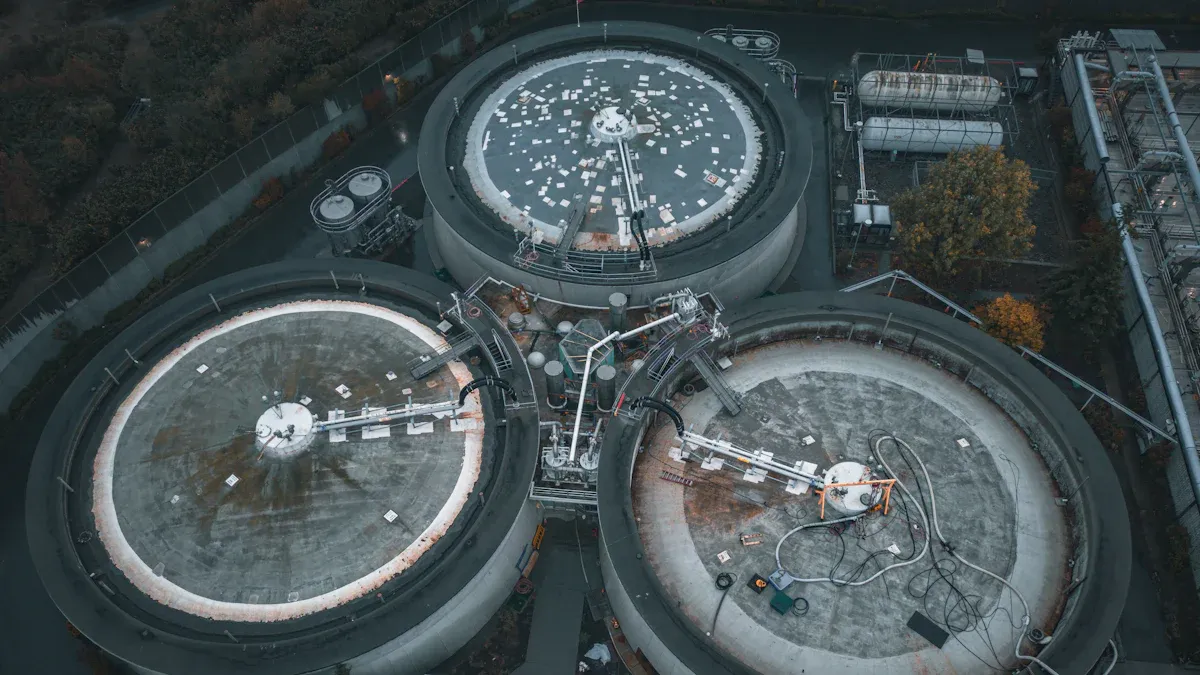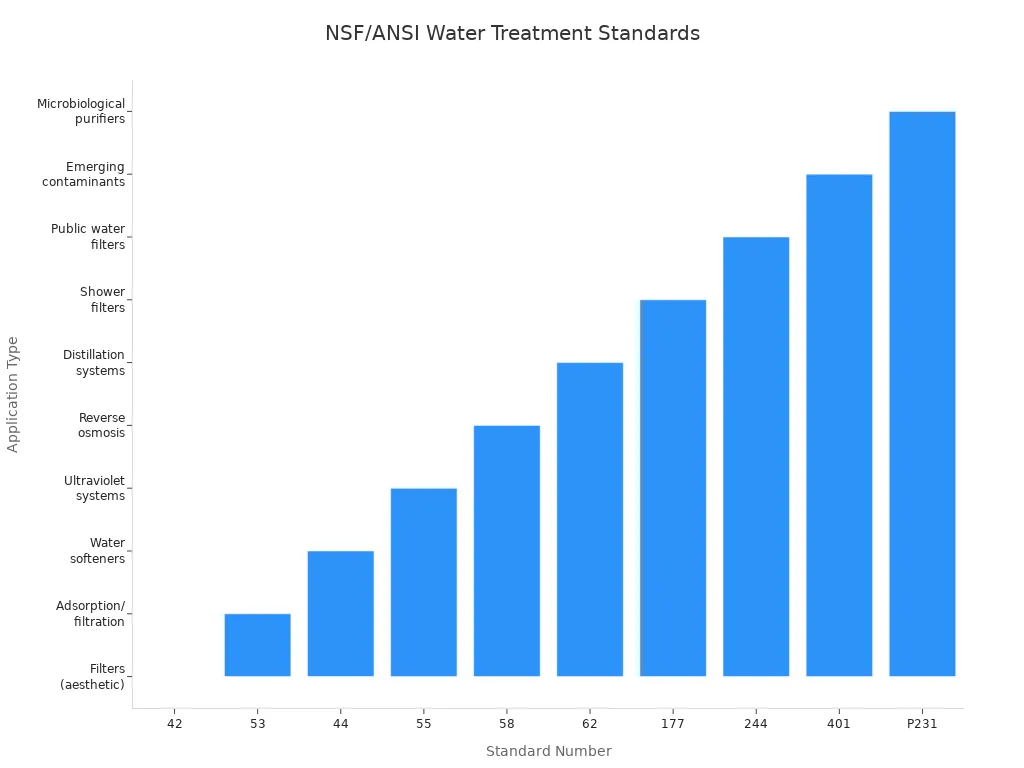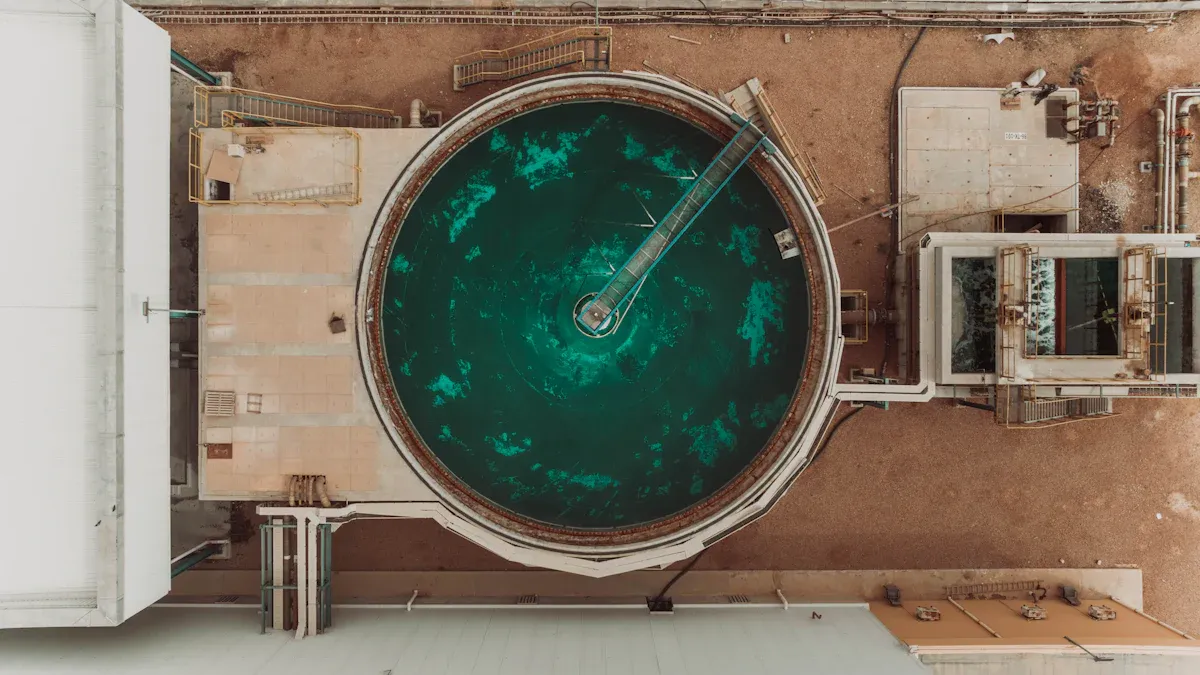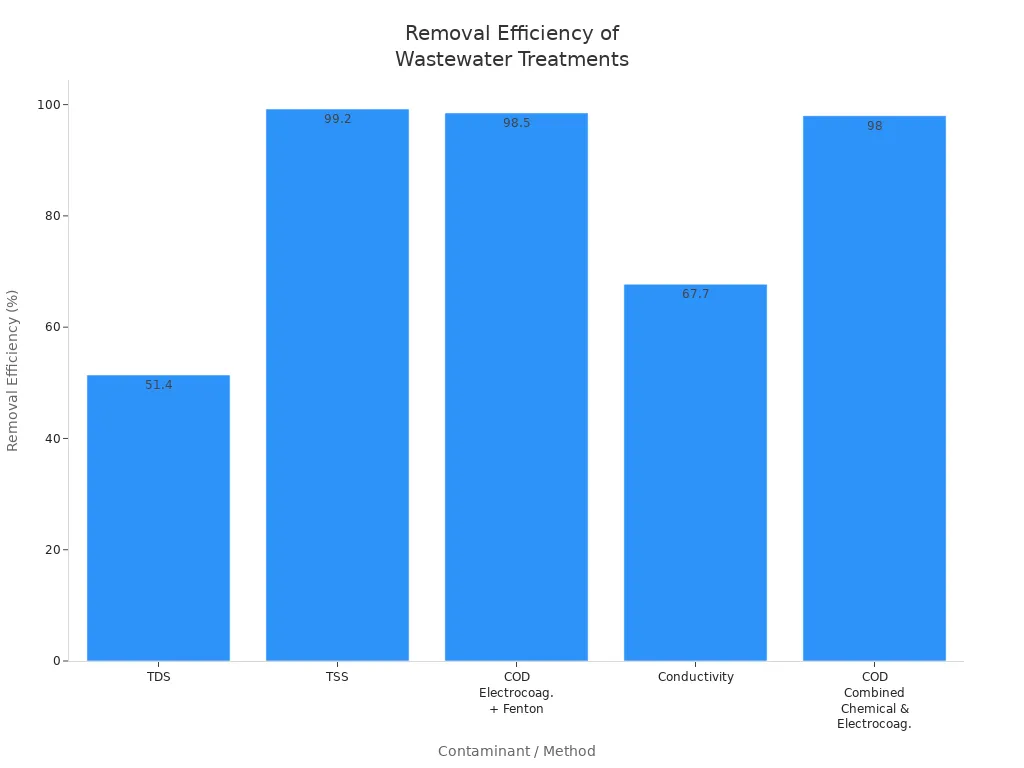Email : zhou@sinobiochemistry.com Phone : +86-13941198570


Views: 0 Author: Site Editor Publish Time: 2025-07-14 Origin: Site








Water treatment uses many chemicals to make water safe. Each chemical has a special job. Coagulants like aluminum sulfate and ferric chloride help take out dirt and solids. Disinfectants such as chlorine and chloramines kill germs. This makes water safe to drink. pH adjusters keep the water balanced. Scale and corrosion inhibitors protect pipes and machines. The table below lists common water treatment chemicals and their main jobs. Dalian Sinobio Chemistry Co.,Ltd. gives water treatment chemicals, biocide chemical, and flame retardant chemical for different needs.
Treatment Type | Chemicals Used | Primary Functions |
|---|---|---|
Water Purification | Chlorine, Chloramine, Aluminum sulfate, Ferrous sulfate, Ferric chloride, Poly DADMAC | Disinfection, flocculation, pH stabilization |
Cooling Water Treatment | Phosphates, Copper sulfate, Scale inhibitors, Biocides, pH adjusters | Prevent corrosion, scale, biological growth, maintain water quality |
Boiler Water Treatment | Alum, Polyaluminum chloride, Defoamers, Soda ash, Sodium phosphate | Remove solids, control alkalinity, prevent foaming, reduce corrosion |
Water treatment uses chemicals like coagulants, disinfectants, and pH adjusters to clean water and keep it safe. Coagulants and flocculants make tiny particles stick together so they can be taken out. This makes the water look clearer. Disinfectants like chlorine kill germs to stop people from getting sick from water. pH adjusters change how acidic the water is to protect pipes and help the treatment work better. Using the right chemicals in a safe way helps protect equipment and the environment. It also makes sure homes and factories get clean water.

Water treatment uses different chemicals to keep water safe. Each chemical type does something special in the process. Experts put these chemicals into main groups:
Coagulants and flocculants
Disinfectants and oxidizers
pH adjusters and neutralizers
Scale inhibitors and corrosion inhibitors
Odor control agents and defoamers
Sludge conditioners
These chemicals help clean water, kill germs, and protect machines. Dalian Sinobio Chemistry Co.,Ltd. sells many water treatment chemicals. They also offer biocide chemical and flame retardant chemical for different uses.
Coagulants and flocculants are important in water treatment. Coagulants like aluminum sulfate, ferric chloride, and polyaluminum chloride help tiny particles stick together. This makes the particles form small clumps. Flocculants, such as polyacrylamide and chitosan, help these clumps grow bigger. The bigger clumps settle or get filtered out. This makes the water look clearer.
Studies show coagulants and flocculants can remove almost all solids from water. Both chemical and natural types work well. Using both together can make results better.
Type | Examples | Typical Use/Notes |
|---|---|---|
Inorganic Coagulants | Aluminum sulfate, Ferric chloride | Remove solids and organic matter |
Organic Coagulants | PolyDADMAC, polyelectrolytes | Help flocs form, often used with inorganic coagulants |
Synthetic Flocculants | Polyacrylamide, polyamines | Used in modern wastewater treatment |
Natural Flocculants | Chitosan, sodium alginate, starches | Eco-friendly, often used with aluminum salts |
Dalian Sinobio Chemistry Co.,Ltd. has coagulant and flocculant polymers for many uses.
Disinfectants and oxidizers are needed to kill germs in water. They destroy bacteria, viruses, and other bad things. Chlorine, sodium hypochlorite, and hydrogen peroxide are common disinfectants. These chemicals break cell walls and damage proteins in germs.
Disinfectant Type | Examples | Mechanism of Action |
|---|---|---|
Oxidizing agents | Chlorine, sodium hypochlorite, hydrogen peroxide | Break cell parts, kill germs |
Protein denaturants | Alcohols, phenolic compounds | Change protein shape |
Membrane disruptors | Alum, alcohols | Cause cells to leak and break |
Water plants use about 1 mg/L of free chlorine to keep water safe. Dalian Sinobio Chemistry Co.,Ltd. sells biocide chemical products for disinfection.
pH adjusters and neutralizers keep water from being too acidic or basic. This helps protect equipment and makes treatment work better. Common chemicals are sulfuric acid, sodium hydroxide, and lime. These chemicals stop pipes from rusting and help other steps work.
Operators add pH adjusters in batches or all the time. Machines and regular checks help keep pH levels safe. Workers need safety gear and training when using these chemicals.
Scale inhibitors and corrosion inhibitors keep pipes and machines from getting damaged. These chemicals stop hard deposits and rust from forming. Polyaspartic acid and its types, plus natural extracts, work well to control scale and corrosion.
Inhibitor Type | Performance | Supporting Evidence / Methods | Notes |
|---|---|---|---|
Polyaspartic acid (PASP) | Stops CaSO4 scale very well | Tested by molecular and chelation studies | Biodegradable, no phosphorus |
Modified PASP derivatives | Better at stopping scale and rust | Tested by static and electrochemical methods | Improved by extra groups |
Natural extracts | Up to 87% less corrosion | Tested by weight loss, XRD, IR | Eco-friendly choices |
Most scale and corrosion inhibitors are used in small amounts. This makes them safe for the environment if used right. Dalian Sinobio Chemistry Co.,Ltd. has many products for factories and cities.
Odor control agents and defoamers help water plants work well. Odor control chemicals like hydrogen peroxide and activated carbon remove bad smells. Defoamers, such as silicone-based antifoams, stop foam from building up.
Chemical Category | Examples | Typical Application Scenarios |
|---|---|---|
Defoamers | Silicone-based, non-silicone antifoams | Stop foam in water and wastewater treatment |
Odor Control Chemicals | Hydrogen peroxide, potassium permanganate, activated carbon | Remove smells in wastewater plants and sludge drying |
Rules limit how much defoamer can be used in some industries. This keeps things safe and working well.
Sludge conditioners help remove water from sludge made during treatment. Main types are inorganic coagulants like ferric chloride, organic flocculants like polyacrylamide, and lime. These chemicals help sludge particles stick together, so water comes out easier.
Inorganic coagulants lower surface charge and help particles join.
Organic polymers link particles and make flocs stronger.
Lime makes sludge stable, cuts odor, and kills germs.
Operators must use the right amount for best results. Too much can make things worse. Safety gear and training are needed when using sludge conditioners.

Water treatment needs the right mix of chemicals to work well. These chemicals help remove bad stuff, protect equipment, and keep things safe. Dalian Sinobio Chemistry Co.,Ltd. has many products, like water treatment chemical, biocide chemical, and flame retardant chemical, for every step of the process.
Water purification uses different chemicals to make water safe. Coagulants like alum and ferric chloride stick small bits together. These bits form bigger clumps called flocs. The flocs sink, so the water gets clearer. Disinfectants like chlorine, chloramine, and ozone kill germs. This step keeps drinking water safe for people. pH adjusters like lime and sodium hydroxide keep water balanced. They also stop pipes from rusting. Corrosion inhibitors, such as phosphates, make a layer inside pipes. This layer protects the pipes. Fluoridation agents help stop tooth decay.
Chemical Type | Main Use in Water Purification | Effectiveness Evidence |
|---|---|---|
Coagulants | Bind particles, improve clarity | Reduce turbidity, enhance sedimentation and filtration |
Disinfectants | Kill bacteria and viruses | Chlorine and ozone provide strong disinfection and sanitization |
pH Adjusters | Balance water pH | Reduce pipe corrosion, protect infrastructure |
Corrosion Inhibitors | Protect pipes from corrosion | Maintain water quality and pipe integrity |
Fluoridation Agents | Prevent dental cavities | Reduce tooth decay, ensure safe dosing |
Dalian Sinobio Chemistry Co.,Ltd. gives chemicals for every step. They also sell biocide chemical and flame retardant chemical products.
Wastewater treatment uses chemicals to clean dirty water. Coagulants and flocculants help take out solids and organic stuff. Oxidants like chlorine and ozone break down bad things and cut smells. Adsorbents like activated carbon grab chemicals that are hard to remove. Advanced oxidation processes help get rid of tough pollutants. Operators use pH adjusters to keep things steady. These chemicals also help remove heavy metals and hormone disruptors.
Studies show no single chemical can clean all wastewater. Using different methods together works best. Dalian Sinobio Chemistry Co.,Ltd. has many chemicals for city and factory plants.
Note: Using chemicals the right way keeps people and nature safe.
Industries use water treatment chemicals to keep things working well. Cooling towers need scale inhibitors and biocides to stop buildup and germs. Boiler water treatment chemicals, like phosphate programs and oxygen scavengers, stop scale and rust in boilers. Chemical plants use pH adjusters and coagulants to clean water. Mining uses special chemicals to treat water and stop rust.
Industry/Application | Main Chemical Roles/Functions | Typical Chemicals Used |
|---|---|---|
Cooling Systems | Scale inhibition, microbial control | Polyphosphates, biocides, scale inhibitors |
Boiler Systems | Scale and corrosion prevention | Boiler water treatment chemicals, oxygen scavengers |
Chemical Processing | pH adjustment, contaminant removal | Sodium hydroxide, sulfuric acid, coagulants |
Mining | Removal of solids, corrosion control | Specialty chemicals, corrosion inhibitors |
Dalian Sinobio Chemistry Co.,Ltd. gives products for these jobs. They help with water purification, wastewater treatment, and boiler water treatment chemicals.

Wastewater treatment uses many chemicals to clean water. Each chemical does something important. Operators pick chemicals based on the kind of wastewater. They also think about what they want to remove. The most common chemicals are coagulants, flocculants, pH adjusters, odor control agents, disinfectants, biocides, adsorbents, and ion exchange resins.
Role in Treatment | Chemicals Used | Description |
|---|---|---|
Removal of Solid Particles | Ferric Chloride, Polymers, Alums | Neutralize charges on particles to aggregate and remove solids |
Neutralization (pH Adjustment) | Sulfuric Acid, Sodium Hydroxide | Adjust pH to required levels for treatment and discharge |
Odor Control | Sodium Hydroxide, Calcium Nitrate, Hydrochloric Acid | Control and reduce unpleasant and harmful odors |
Disinfection | Sodium Hypochlorite | Destroy pathogenic microorganisms to prevent disease spread |
Sludge Treatment & Removal | Polymers | Remove water from sludge to reduce volume and ease disposal |
Operators use coagulants and flocculants to make small bits stick together. These bigger clumps settle down, so water gets clearer. pH adjusters like sulfuric acid or sodium hydroxide keep water balanced. Odor control agents, like calcium nitrate, stop bad smells. Disinfectants and biocides, such as sodium hypochlorite, kill germs. Adsorbents, like activated carbon, grab organic compounds and some metals. Ion exchange resins help take out harmful ions, including heavy metals.
Chemical Type | Examples | Role in Wastewater Treatment |
|---|---|---|
Adsorbents | Activated Carbon | Remove organic compounds by physical adsorption |
Ion Exchange Resins | Anion and Cation Exchange Resins | Remove ionic pollutants such as nitrates, chlorides, heavy metals |
Disinfectants | Chlorine, Ozone, UV, Hydrogen Peroxide | Kill or inactivate bacteria, viruses, and other microorganisms |
Dalian Sinobio Chemistry Co.,Ltd. gives many wastewater chemical solutions. They also sell biocide chemical and flame retardant chemical products. These products help city and factory water treatment plants.
New chemicals help remove tough pollutants better. Advanced oxidation processes, like UV/H2O2 and ozonation, break down organic pollutants and viruses. Membrane technologies and activated carbon work well for removing bacteria, viruses, dyes, and pesticides. Nanotechnology and metal-organic frameworks can remove up to 95% of heavy metals and over 90% of organic pollutants. These new ways make wastewater chemical solutions more effective and better for the environment.
Operators use different ways to add wastewater treatment chemicals. The method depends on what needs to be cleaned and the goal. Many plants use a mix of physical, chemical, and biological steps for best results.
Direct Dosing: Operators put chemicals like coagulants, flocculants, and pH adjusters right into the water. This works fast and mixes well.
Batch Treatment: Some places treat water in batches. They add chemicals, wait for reactions, then move to the next step.
Hybrid Systems: Many plants use chemical treatment with biological and physical steps. For example, membrane bioreactors use both biological breakdown and filtration. Activated carbon and ozone treatments help remove organic pollutants and make water better.
Advanced Techniques: Electrocoagulation and Fenton’s process remove dissolved and suspended solids very well. These methods also lower chemical oxygen demand and make treated water better.
Treatment Method | Contaminants Removed | Removal Efficiency (%) | Notes |
|---|---|---|---|
Electrocoagulation + Fenton | TDS | 51.4 | Combined treatment showed significant reduction in total dissolved solids. |
Electrocoagulation + Fenton | TSS | 99.2 | Nearly complete removal of total suspended solids achieved. |
Electrocoagulation + Fenton | COD | 98.5 | High chemical oxygen demand removal, meeting regulatory standards (NEQS). |
Electrocoagulation + Fenton | Conductivity | 67.7 | Substantial reduction in conductivity indicating removal of ionic species. |
Combined Chemical & Electrocoag. | COD | ~98 | Demonstrated cost-effective and sustainable treatment with low energy demand. |

Tip: Hybrid systems that use both chemical and biological steps often remove the most pharmaceutical and industrial pollutants.
Safety is very important when using wastewater treatment chemicals. Operators must wear gloves, goggles, and protective clothes. Chemicals need to be stored in places with good air flow and clear labels. Emergency plans should cover spills, leaks, and equipment problems. Workers need regular training to spot dangers and follow safety rules. Plants must check and fix equipment to stop accidents. Special permits and checks are needed for confined spaces. All chemical storage must follow fire codes and local laws.
Dalian Sinobio Chemistry Co.,Ltd. gives wastewater chemical solutions that meet strict safety and quality rules. Their products include water treatment chemical, biocide chemical, and flame retardant chemical options. These products help keep chemical treatment of wastewater safe and effective for cities and factories.
Choosing the right water treatment chemicals helps keep water safe. Chemicals like water treatment chemical, biocide chemical, and flame retardant chemical are important for good water management. Knowing what each chemical does helps make water and wastewater treatment work better.
Talking to suppliers such as Dalian Sinobio Chemistry Co.,Ltd. can help you get the right chemicals for your needs. They make things easier and help you follow the rules.
Picking the right chemicals helps save resources, makes less waste, and keeps equipment safe.
Always use safety gear, follow safety rules, and obey all laws when working with chemicals.
Operators use coagulants, disinfectants, pH adjusters, and corrosion inhibitors. These chemicals help take out solids and kill germs. They also keep pH balanced and protect pipes from damage. Dalian Sinobio Chemistry Co.,Ltd. gives water treatment chemical, biocide chemical, and flame retardant chemical for these jobs.
Coagulants make tiny bits in water stick together. Flocculants help these clumps get bigger. The bigger clumps sink or get filtered out. This makes the water clearer and safer to use.
If used the right way, water treatment chemicals are safe. Operators follow rules to keep levels safe for people. Dalian Sinobio Chemistry Co.,Ltd. has products that help make water safe to drink and use in factories.
Yes, some chemicals can take out heavy metals from water. Ion exchange resins and special coagulants help do this job. These chemicals make water safer for people and nature.
Industries can buy water treatment chemical, biocide chemical, and flame retardant chemical from Dalian Sinobio Chemistry Co.,Ltd. The company has many products for city, factory, and wastewater treatment.